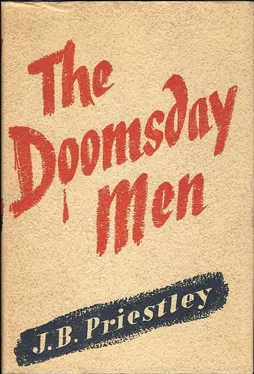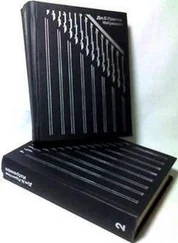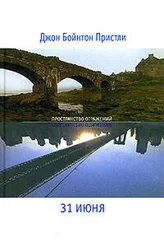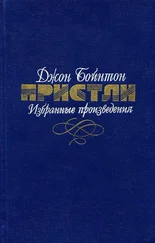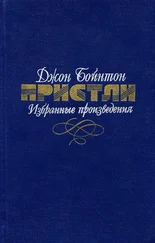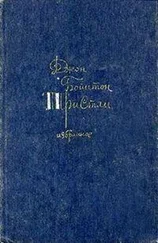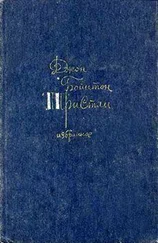Then he made up his mind to say what he had to say and then clear out. “Listen, Professor Engelfield,” he began earnestly, “I’m sorry if I’m butting in where I’m not wanted, but I’ve been trying to find you for a long time. After all, we were working in the same field, and I felt you might be able to tell me something-”
“I might-at that,” said Engelfield, sardonically.
“Well, nobody knew anything about you-and I tried to find out where you were-knew you must be working somewhere-then this afternoon when I heard you asking for those instruments to be sent out to Barstow-”
“How’s that?” This came like a pistol shot from the older man, who glanced angrily at Engelfield. The latter gave a shrug, exchanged a further glance with the other, then suddenly, as if he had now made up his mind, turned and smiled.
“Your guess was right, of course, Hooker,” he said, quite pleasantly. “I haven’t been wasting my time. But-well, this is difficult. I’ll have to have a word with my brother here-he’s been paying the piper lately-before I can decide if I can tell you anything. Now if you’ll excuse us a minute-just sit right here-have a cigarette?-fine!”
In a glow of triumph, for here at the last minute he seemed to have pulled it off, not only having found Engelfield but now standing a fair chance, it seemed, of being admitted to his confidence, George Glenway Hooker smoked his cigarette, and had come to the end of it before the brothers returned from the neighbouring room in the suite. They returned smiling, confident, and for some obscure reason Hooker did not like the look of them. Yet they were now quite friendly.
“Well, that’s all settled,” said Engelfield smoothly. “I don’t say I can tell you everything-but I might be able to tell you one or two things you don’t know.”
“Fine!” cried Hooker, so delighted that he began to babble a little. “And I don’t mind telling you, Professor Engelfield, I’m so dead keen I’d have followed you right out to Barstow or wherever you are in California-just to see what you’re doing.”
“You would, eh? What did I tell you, Henry? These boys mean business. And when were you thinking of sailing, Hooker?”
“This week.”
“Well, we’ve time. Now what I suggest is this-and of course it’s up to you-I’ve nothing here, and for the next twenty-four hours I have to stay here, to clear things up-but I’ve been staying at a little place in the country that Henry rented-and all my notes are down there. Now if you could get down there to-morrow night, when we could be quietly by ourselves, I could give you some idea of what I’ve been doing-and, believe me, it’s worth a little trouble.”
Hooker was all enthusiasm. His ship did not sail until the day following; he could just manage it. What a break! “There’s nothing I’d like better,” he cried. “Where is it?”
“The house is called The Old Farm , and it’s just outside a village called Ewsbury, about twenty miles this side of Oxford. If you’re going down by train-you’d have to, eh?-all right, then-it’s what they call a Halt on a side-line of the Great Western Railway. You get down there about nine to-morrow night. I’ll be there then or as soon afterwards as I can make it. Now, there’ll be nobody in, because we’ve just dismissed the servants-we’re giving the place up-but if I’m there, the front door will be open. If I’m not, don’t wait outside, go round to the back-you can easily get in through a window if the door happens to be locked-and go right upstairs, turn to the right at the top and it’s the far room, and wait in my study. I left a sheaf of notes on the table there, and if you have to wait, you can amuse yourself trying to decipher ’em. How’s that?”
It sounded a bit complicated, but Hooker enthusiastically agreed, and made a careful note of the place and all the other directions.
“You’re a fortunate young man,” said the heavy brother Henry, rather grimly.
“I’ll say I am,” cried Hooker, who felt he was. “There’s something pretty big coming, I guess. You’re sure to be there to-morrow night, aren’t you, Professor Engelfield, because my boat sails pretty soon?”
“Don’t worry about that.” He waited a moment. “There’s something you could do for me. That bag, Henry.” The latter nodded, and went into the adjoining room. Engelfield smiled at Hooker, and continued: “If you want to be sure I’ll be there, and do something for me at the same time, I wish you’d take this bag down there for me-I’m going to be pretty loaded up and I’m mighty forgetful these days. All you have to do is to take it down with you and, if I’m not there first, see that you take it upstairs with you into the study. All right? Fine! By the way, you needn’t bring a bag of your own down there because I can easily fix you up with everything you want, if you stay the night. Now here’s the bag I want you to take down for me.”
Henry had returned and solemnly handed over to Hooker a small but heavy leather suitcase. “It’s locked, young man,” he said. “So you don’t need to worry about that. And now-if my brother doesn’t mind parting from you so soon-” It was a dismissal.
Hooker accepted it cheerfully. Once this ponderous brother was out of the way, and he and Engelfield were together, with a sheaf of notes and the quiet night in front of them, they could really talk.
“To-morrow night then-at the Old Farm, eh?” said Engelfield, steering him and the bag towards the door. “Sorry we can’t start right now, but Henry here has too many irons in the fire and we’re trying to clear things up-you know how it is?”
“Yes. And thanks. This is a great chance for me,” said Hooker earnestly, looking his gratitude. There was a kind of flicker went across the dark bearded face, as if a tiny shadow passed over it, but at that moment Hooker was too intent upon showing his gratitude even to wonder what it meant. He strode out of the Savoy Hotel, heavy little bag in hand, like a conqueror. At one tremendous stroke he had not only found Professor Engelfield but had miraculously contrived to win his confidence. Hooker did not doubt for a moment that there was something sensational coming: Engelfield had the look of a man whose research had been wildly successful. And during the next twenty-four hours, when he was outwardly busy packing and sending his baggage off to the ship, paying his bills, and clearing up generally, George Glenway Hooker was also too happily busy in his mind wondering what form Engelfield’s new discovery would take, whether there had been at last some startling results from the heavier nuclei , to give more than a passing thought or two to Engelfield’s sudden change of attitude, and indeed of character. So far as he came to any conclusion at all about that, he concluded with some self-reproaches that what he and some others had thought was arrogance was really a form of shyness, the equivalent in the older man of his own awkward manner. In his gratitude, in his sense of lively expectation, he felt now that Professor Engelfield was at heart as good a fellow as he was a scientist.
So it was a very happy tall young American who went down, the next evening, on the leisurely little Great Western train to Ewsbury. He dined off a meat pie and bread and cheese and beer in a tiny inn not far from the railway, and began to feel a new affection for this damp green island. The countryside down there was one of rounded hills and sudden hollows, like fragrant cups of greenness and blue dusk, and everything seemed to be touched with mouldering antiquity. Ewsbury itself, however, which straggled along the road for half a mile or so, was not lost in the deep silence of the neighbouring hills and hollows. It was enjoying a fair, a noisy whirl of gilt and coloured lights, which Hooker passed on his way to the Old Farm. It seemed quite a large fair for so small a place, and Hooker, who had a nice taste in roundabouts and side-shows, was sorry he had no time to explore it. The Old Farm, an ancient gnome informed him in a sing-song hard to understand, was about a mile farther on; so the young man, still carrying the bag he had been entrusted with, kept his long legs in motion, waving a farewell to both the fairground and the ancient gnome who stood shakily looking at it. If the miserable parody that the English called a summer had been doing its worst to-night, Hooker would still have marched happily through it, but actually the night was fine, very rich in fragrance, and with a damp green magic of its own. His thoughts hazily expanded with the wide misty-blue night itself; anything, he felt, might happen; miracles were possible in this antique enchanted kingdom, whose influence might explain the sudden change in Engelfield, himself transformed-perhaps like his heavier nuclei -under these mild stars. Many a time afterwards, sometimes with regret, sometimes with derision, Hooker remembered that walk.
Читать дальше
